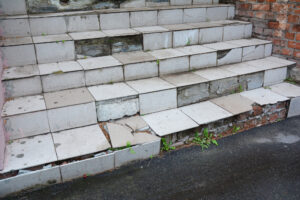 Have you ever been injured while on someone else’s property? If so, you may be entitled to legal compensation for your injuries. The law provides protection for visitors who get hurt on premises owned by another person or entity. This article will explain the grounds for a premise liability claim and how it works.
Have you ever been injured while on someone else’s property? If so, you may be entitled to legal compensation for your injuries. The law provides protection for visitors who get hurt on premises owned by another person or entity. This article will explain the grounds for a premise liability claim and how it works.
Premise liability claims can arise from any number of dangerous conditions present on someone else’s property. Victims of slip-and-fall accidents caused by hazardous surfaces or inadequate security measures, among other on-premise incidents, have the right to seek justice through the legal system. However, to successfully file a claim, you must establish specific grounds to justify it.
The specifics of a premise liability case vary depending on where the state occurs. Each state has different laws regarding this type of litigation. Therefore, anyone considering filing such a claim should consult with an experienced lawyer before taking action to ensure they understand their rights under the local law. That said, it would be best to explore what constitutes valid grounds for making a premise liability claim.
Definition Of Premise Liability Claim
A premise liability claim is an action taken against a property owner when they fail to take reasonable measures to protect visitors against health and safety hazards on their property. Notably, premises liability defined by law dictates that specific grounds must be present for someone to have a valid claim and be eligible for compensation.
Grounds For A Premise Liability Claim
 For this type of claim to be successful, you must establish these three elements:
For this type of claim to be successful, you must establish these three elements:
- Negligence: This occurs when the landowner fails to exercise appropriate care under the circumstances leading up to the incident causing injury or damage.
- Causation: This means that you can prove beyond doubt that the accident would not have happened without the landowner’s oversight.
- Injury: There must be an actual injury resulting from these events, including physical harm or financial loss due to damages incurred.
If all these elements are present, there may be grounds for a premises liability claim, and the plaintiff may seek compensation from the at-fault party for their damages. This can include medical expenses, lost wages from time away from work, pain, suffering, and other costs related to the incident. The amount awarded will depend upon several factors, such as the degree of fault and severity of injuries sustained.
Common Situations Leading To Premise Liability Cases
Knowing the grounds for a premise liability claim can help identify when someone else’s careless behavior caused an injury. The following are examples of circumstances that could give rise to a successful premise liability claim:
- Slip-and-fall accidents
- Negligent security against criminal activities
- Inadequate maintenance leading to injury
- Dog bites and other animal-related incidents
- Swimming pool accidents
- Elevator and escalator accidents
- Amusement parks accidents
- Toxic fumes or chemicals
However, to pursue just compensation, one should have sufficient evidence that the property owner was aware of these hazards yet failed to take appropriate action. By understanding these scenarios where premise liability cases arise, individuals can better assess whether they have grounds for such claims following incidents involving dangerous conditions.
Compensation In Premises Liability Claims
The potential for compensation in a premises liability claim is considerable. Victims of accidents due to hazardous conditions on someone else’s property can be eligible for damages, including the following:
- Medical costs are any costs associated with treating physical injuries or mental trauma resulting from an incident on another party’s premises.
- Lost wages refer to reimbursement for income lost while recovering from an accident or attending related court proceedings.
- Pain and suffering refer to payments for noneconomic damages caused by the injury, such as past and future pain, discomfort, or psychological trauma.
- Property damage costs cover repair or replacement costs for items damaged during the accident and any out-of-pocket expenses incurred.
No matter how much money is at stake, these cases require thoughtful consideration before filing a claim; understanding what kind of legal action needs to be taken is essential in ensuring victims obtain full justice. Knowing your rights helps ensure you get the maximum amount available under the law to move forward comfortably with your life post-accident.
Conclusion
It’s clear that premise liability claims are serious matters and should not be taken lightly. As such, property owners must take full responsibility for the safety of those who come into their properties. They must understand the elements and examples of a premises liability claim to remain compliant with the law.
The process of making a premises liability claim can be daunting. Still, it can feel manageable if you do your due diligence and research all your options before beginning the process. Nevertheless, consult an experienced personal injury attorney who can provide guidance throughout this ordeal, and ensure that you receive just compensation for any losses suffered due to a negligent property owner’s action.


